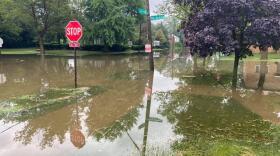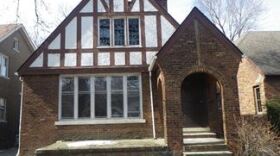The Great Lakes Water Authority (GLWA) says it will deny all of the damage claims related to last summer's severe rainstorms.
The June 25 and June 26 storms caused widespread flooding in people's homes in affluent and low-income communities alike in southeast Michigan.
GLWA acknowledges in a report that it commissioned that some of its pumps failed during the storms, but that report also said the water would have backed up into people's basements anyway, because of the "unprecedented" intensity and duration of the rainfall.
Josh Elling said he's extremely disappointed by GLWA's announcement. He's CEO of Jefferson East, Incorporated, a non-profit serving people in the East Jefferson corridor in Detroit.
He said GLWA is shirking its responsibility to assist residents, and placing an unfair burden on nonprofits like his to find private grants to help people with damage more than a year after the event.
"People are still recovering," he said. "Just last week we were in a home with an elderly resident that had massive amounts of mold in her basement that our crews were able to get rid of. And she had been living with that for more than a year."
Elling said there are at least 40 residents in East Jefferson corridor neighborhoods that still do not have working furnaces. Jefferson East, Inc. is scrambling to find funds to replace furnaces, so the residents don't have to go through a second winter warming their homes with kerosene space heaters.
He said FEMA offered grants of about $5,000 to $10,000, which often covered only a small portion of the damage to people's property. Some people used the grant to replace their cars, which were destroyed by the flooding, leaving them with no money to clean out and repair damage to their basements, he said, and some people filled out their FEMA applications incorrectly and received nothing in aide.
Attorney Paul Doherty, whose law firm sued GLWA on behalf of about 600 residents in affluent and low-income neighborhoods across the region, said he was not surprised GLWA is attempting to evade its responsibility. He called the announcement a public relations stunt. "They are still responsible for the damage," he said. He said the Authority didn't invest in pump system maintenance that could have prevented the damage to homes.
Doherty said he himself woke up at 2:15 a.m. the night of the first storm, to discover eight feet of stormwater in his basement.
"This was devastating to people. Okay, you don't know what it's like until you have a basement full of water, literally, like a pool. And you know, I had people calling me later that were approaching the winter and still didn't have a furnace."
Doherty estimates the total damage from the storms is about $190 million. The lawsuit is seeking class action status. He said the judge in the case has not yet ruled on a motion by GLWA to dismiss.
In a press release, the Water Authority says it plans more infrastructure improvements in the future:
“We understand the difficult situations homeowners and businesses face when flooding occurs,” said Suzanne R. Coffey, GLWA’s Chief Executive Officer. “We are experiencing increased frequency and intensity of storms hitting our region. This is why it’s critical to focus on building resiliency in the regional system. Even before the release of the final report from the Independent Investigators, GLWA began working to implement key infrastructure and process improvements to help address the stresses put on an infrastructure system not built for this level of rain."












